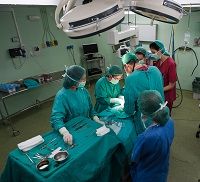Article
Adrenal Surgery and Anesthesia
Author(s):
When surgical patients have tumors that secrete adrenal hormonal, the anesthesiologist needs to thoroughly address preoperative evaluation, perioperative hemodynamic control, electrolytes, and metabolic abnormalities

The adrenal gland produces three hormones: glucocorticoids, mineralocorticoids, and androgens. The systemic effects are far-reaching when production of any of these malfunctions. When a patient needs adrenal surgery the ideal surgical team includes an endocrinologist, a radiologist, an anesthesiologist, and a surgeon. The January 2015 issue of the Journal of Clinical Medicine Research has published a review article that discusses anesthesiology considerations when confronted with the need for adrenal surgery.
The authors cover 3 adrenal problems that lead to surgery: Conn’s syndrome, Cushing syndrome, and pheochromacytoma.
In Conn’s syndrome, aldosterone hypersecretion increases the renal tubular exchange of sodium for potassium and hydrogen ions, leading to hypertension, hypokalemic alkalosis, skeletal muscle weakness, and fatigue. Hypokalemia and metabolic alkalosis may prolong neuromuscular blocking agents’ actions and induce bradycardia. Sevoflurane should be avoided (it induces polyuria). Manipulating the adrenal gland during dissection and resection cause catecholamine release. Brisk and untreatable intraoperative hypertension can occur.
In Cushing’s syndrome, anesthesiologists are often confronted with perioperative hypertension, hyperglycemia, hypokalemia, and aberrant cortisol blood levels. These patients are at an increased risk for gastric aspiration. Patients who are obese or have proximal muscle weakness may develop airway management problems.
Pheochromacytoma is the greatest challenge because it can cause excess catecholamine secretion and induce a sympathetic storm leading to severe hypertension and arrhythmias. Up to one-half of deaths in patients undergoing surgery for pheochromacytoma occur during anesthesia induction. The entire team needs to agree on the triad of perioperative hemodynamic control, intraoperative control, and postoperative care.
The authors note that when surgical patients have tumors that secrete adrenal hormonal, the anesthesiologist needs to thoroughly address preoperative evaluation, perioperative hemodynamic control, electrolytes, and metabolic abnormalities. Often, the anesthesiologist needs to review her overall knowledge about the specific diseases. After assessment, she needs to create a detailed and careful anesthetic strategy.
In all cases, anesthesia can affect control and maintenance of postoperative adrenal function, so collaboration with other involved colleagues is essential.





